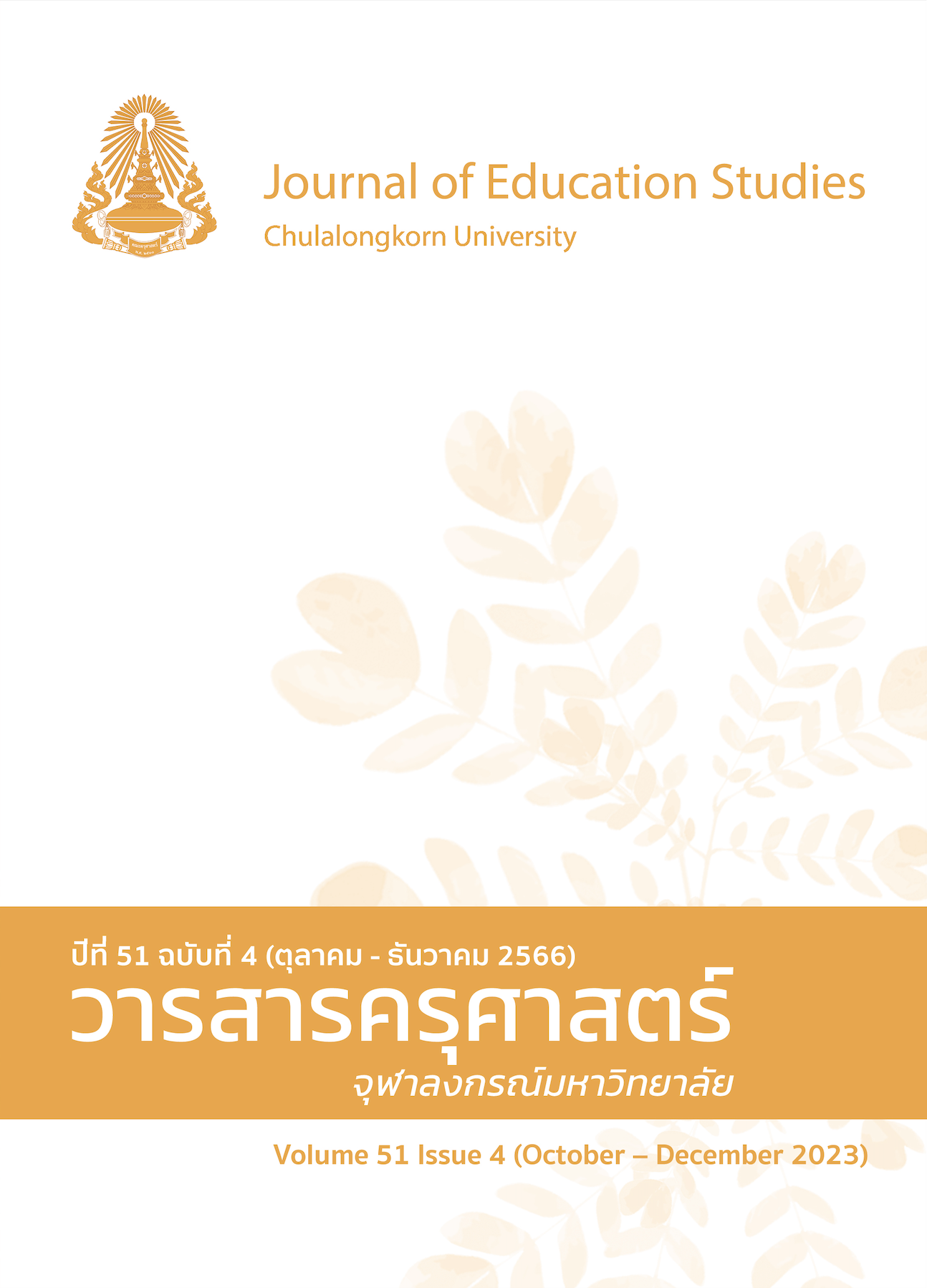Psychometric Properties and Factor of Intercultural Competence Based on the Intercultural Development Continuum for Undergraduate Students
DOI:
https://doi.org/10.14456/educu.2023.36Keywords:
situational test, intercultural competence, exploratory factor analysis, social desirability respondingAbstract
The purpose of this research is to analyze the psychometric properties and components of intercultural competence using the concept of the Intercultural Development Continuum. The sample consisted of 131 undergraduate students in the Faculty of Education. The research tool was a situational test for evaluating intercultural competence. Data were analyzed using content validity, Exploratory Factor Analysis (EFA), correlation coefficients, variance analysis, and difficulty and discriminant analysis using the Graded-Response Model (GRM). The research findings indicate that: 1) The questions were all content-valid. 2) Intercultural competence comprises three components, namely (1) conflict management, (2) respecting differences in ideas and (3) adhering to societal rules. 3) The situational assessment test showed internal consistency based on Cronbach's alpha, the expected a posteriori method was moderate, and the stratified alpha coefficient was determined to be .52. 4) The analysis of the test using the GRM model suggests that the questions were appropriate. 5) The comparison of the difference in mean scores between year levels did not show statistically significant differences at the .05 level, while the difference in mean scores between men and women was significantly different at the .05 level. 6) The results of the situational test for assessing intercultural competence showed no relationship with the social desirability test.
References
ภาษาไทย
คณะกรรมการการศึกษาแห่งชาติ, สำนักงาน. (2545). แผนการศึกษาแห่งชาติ (พ.ศ. 2560 – 2579). สำนักงาน
คณะกรรมการการศึกษาแห่งชาติ.
ชุตินันท์ จันทรเสนานนท์. (2553). การพัฒนาแบบวัดสมรรถนะเชิงวัฒนธรรมสาหรับนักเรียนมัธยมศึกษา.
[วิทยานิพนธ์ปริญญาดุษฎีบัณฑิต ไม่ได้ตีพิมพ์]. จุฬาลงกรณ์มหาวิทยาลัย.
ณัฏฐภรณ์ หลาวทอง. (2561). การสร้างเครื่องมือการวิจัยทางการศึกษา (พิมพ์ครั้งที่ 2). สำนักพิมพ์แห่ง
จุฬาลงกรณ์มหาวิทยาลัย.
ยุทธศาสตร์ชาติ 20 ปี พ.ศ. 2561-2580. (2561, 13 ตุลาคม). ราชกิจจานุเบกษา. เล่ม 135 ตอนที่ 82. หน้า 1-6
วรรณี แกมเกตุ. (2555). วิธีวิทยาการวิจัยทางพฤติกรรมศาสตร์ (พิมพ์ครั้งที่ 3). สำนักพิมพ์แห่งจุฬาลงกรณ์มหาวิทยาลัย.
ศิริชัย กาญจนวาสี. (2556). ทฤษฎีการทดสอบแบบดั้งเดิม (พิมพ์ครั้งที่ 7). สำนักพิมพ์แห่งจุฬาลงกรณ์มหาวิทยาลัย.
ศิริชัย กาญจนวาสี. (2563). ทฤษฎีการทดสอบแนวใหม่ (พิมพ์ครั้งที่ 5). สำนักพิมพ์แห่งจุฬาลงกรณ์มหาวิทยาลัย.
ภาษาอังกฤษ
Adams, R. J. (2005). Redliability as a measurement design effect. Studies in Educational Evaluation,
, 162-172. https://doi.org/10.1016/j.stueduc.2005.05.008.
Bennett, M. (2013) Basic concepts of intercultural communication: Paradigms, principles, & practices. Boston: Intercultural Press.
Cronbach, L. J., Schönemann, P., & McKie, D. (1965). Alpha coefficients for Stratified-Parallel Tests. Educational and Psychological Measurement, 25(2), 291–312. https://doi.org/10.1177/001316446502500201.
Dunbar, N. E., & Hoang, L. M. (2019). Intercultural competence and demographic factors: Examining the effects of age, gender, and geographic location. Journal of Intercultural Communication Research, 48(4), 323-345.
Polit, D. F., & Beck, C. T. (2017). Nursing Research: Generating and Assessing Evidence for Nursing
Practice. (10th ed.). Philadelphia: Lippincott Williams & Wilkins.
Solhaug, T., & Kristensen, N. N. (2020). Gender and intercultural competence: Analysis of intercultural competence among upper secondary school students in Denmark and Norway. Educational Psychology, 40(1), 120–140. https://doi.org/10.1080/01443410.2019.1646410.
Yuan, X. (2022). It was Neither Confucian nor Confusion: Dynamics of Intercultural Sensitivity among East-Asian Students at Canadian Universities. [Master’s thesis, Lakehead University]. ResearchGate. https://www.researchgate.net/publication/364331085.
Downloads
Published
How to Cite
Issue
Section
License

This work is licensed under a Creative Commons Attribution-NonCommercial-NoDerivatives 4.0 International License.




